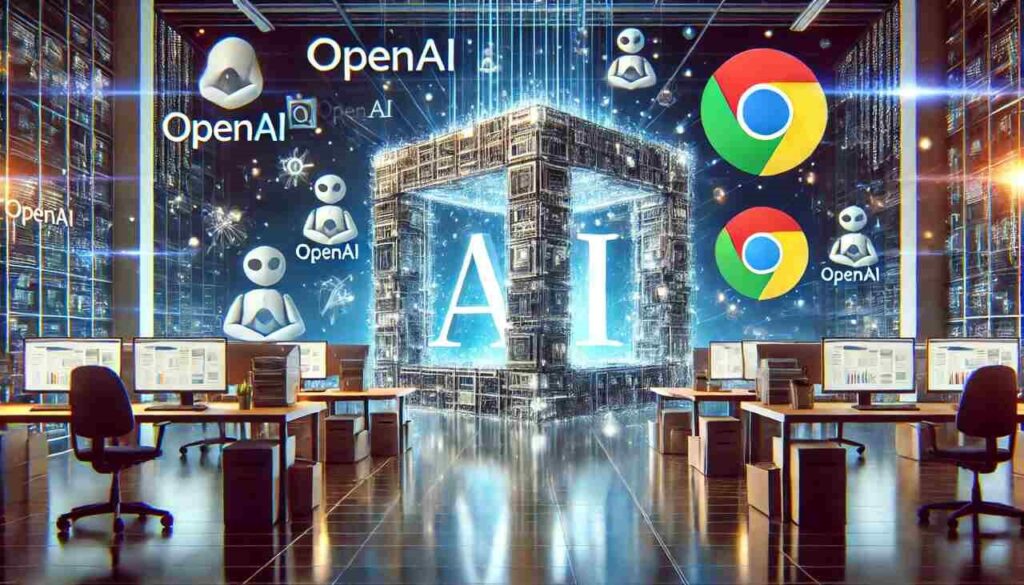Why Does OpenAI Want to Acquire Google Chrome?
To Integrate AI Functionality at the Browser Level
OpenAI plans to embed conversational AI capabilities natively within the browser interface. By acquiring Chrome, OpenAI would gain direct access to over 3 billion active users globally. Embedding GPT technology into Chrome enables real-time AI-assisted browsing, personalized content summarization, semantic search enhancement, and voice-activated web navigation, aligning with user demand for frictionless digital experiences.
To Gain Control Over a Dominant Web Gateway
Chrome controls over 65% of the global browser market share. Ownership of Chrome would grant OpenAI an unprecedented ability to shape how users interact with the internet. The browser functions as a gateway to digital content, and OpenAI could leverage this advantage to control ad delivery systems, data collection strategies, and cross-platform integration.
To Create a New Revenue Stream through Personalized AI Ads
Integration of GPT into Chrome could enable hyper-personalized, contextually-relevant advertisements. Using user intent detection, semantic segmentation, and real-time behavior analysis, OpenAI could revolutionize the online ad ecosystem. Browser-based AI can generate native ad experiences that match a user’s search history, page content, and clickstream patterns.
To Develop a Competitive Edge Against Microsoft and Meta
Microsoft has deeply integrated ChatGPT into Bing and Windows OS, while Meta has begun embedding AI in its platforms. By owning Chrome, OpenAI can establish full-stack control, from hardware acceleration to software optimization, for AI-driven internet experiences. This move supports OpenAI’s transition from a backend AI provider to a vertically-integrated tech ecosystem.
What Strategic Value Does Chrome Hold for OpenAI?
As a High-Value Data Stream Source
Google Chrome processes immense volumes of real-time user interaction data. Each click, keystroke, and scroll generates behavioral patterns ideal for training and refining large language models (LLMs). Owning Chrome would give OpenAI direct access to this behavioral data, improving its semantic search precision and AI personalization accuracy.
As an Operating System Proxy (Chrome OS Ecosystem)
Chrome is more than a browser, it’s the foundation of ChromeOS. OpenAI could use this lightweight operating system to deploy GPT-based software natively across education, enterprise, and consumer devices. This strategy would allow OpenAI to offer AI-enhanced productivity tools as OS-level utilities, bypassing the need for third-party integrations.
As a User Retention and Engagement Platform
OpenAI would benefit from Chrome’s existing user loyalty metrics and average daily usage time. Embedding AI agents directly into the browsing experience would increase session durations and expand user retention. Features like AI-driven news aggregation, smart tab grouping, and semantic search suggestions can deepen user dependency on Chrome-AI synergy.
As a Web-Scale AI Inference Engine
Google Chrome’s rendering engine (Blink) and V8 JavaScript engine could be fine-tuned to run GPT models more efficiently within the browser itself. This architecture would reduce server load, enable edge-based inference, and open pathways for AI functioning in offline or low-bandwidth conditions, expanding accessibility to developing regions.
What Are the Implications for the Broader Tech Industry?
Impact on Google’s Dominance in Search
An OpenAI-led Chrome could re-route user queries away from Google Search toward AI-generated semantic answers. Instead of traditional keyword indexing, users would receive contextual, human-like summaries. This shift could decrease Google’s ad revenue and reshape the SEO landscape toward answer engines rather than search engines.
Acceleration of AI-First Browsing Paradigms
If Chrome becomes AI-native, competing browsers like Firefox, Safari, and Edge would be pressured to adopt or partner with advanced LLM platforms. A new standard would emerge where search bars evolve into dialogue boxes, bookmarks become AI-curated feeds, and extensions become autonomous digital agents.
Erosion of Data Privacy Expectations
An AI-powered Chrome would collect and process sensitive user data for training and personalization. Privacy watchdogs and digital rights groups may challenge OpenAI’s data policies, especially regarding consent, storage duration, and AI model interpretability. Regulatory compliance under GDPR and CCPA would become a central issue.
Transformation of the Web Development Ecosystem
Web developers may need to optimize websites not just for indexing bots but also for LLM parsing and AI interpretation. Structured data, semantic markup, and natural language compatibility will become essential. Websites built with clear entity-attribute-value structures would gain visibility in AI-generated answers.
Could the Acquisition Realistically Happen?
Unprecedented Regulatory Scrutiny
The U.S. Federal Trade Commission (FTC) and EU’s Digital Markets Act would likely investigate the deal under antitrust regulations. Combining the world’s most-used browser with the world’s most powerful LLM would raise concerns over monopolistic practices and market manipulation in both advertising and AI infrastructure.
Unclear Willingness from Google to Sell Chrome
Google’s core search and advertising business is tightly integrated with Chrome. Selling it would be a monumental strategic reversal. However, if under pressure from antitrust regulators to divest, Chrome could be spun off, making it a plausible acquisition target for OpenAI or other players like Amazon or Apple.
Possible Joint Venture Instead of a Full Acquisition
If a full acquisition proves impractical, a strategic alliance or joint venture between OpenAI and Google could emerge. Such a partnership might involve embedding GPT models into Chrome while maintaining Google’s ownership structure, similar to how Microsoft embedded ChatGPT into Bing without a full merger.
For more exciting news articles you can visit our blog royalsprinter.com

